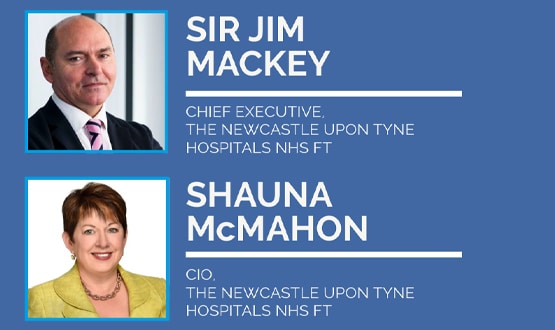NHS Digital Academy officially launched
- 11 September 2017

The NHS Digital Academy has been officially launched, in a move described as the marking the start of establishing informatics as a profession.
The NHS Digital Academy was officially launched here in Manchester today (11 September) in a move designed to create a step-change in the way the NHS develops digital leaders, and described as marking a key step in establishing informatics as a profession.
The Academy was described by Harpreet Sood, associate national chief clinical information officer (CCIO) and lead on the programme, as “an informatics leadership course for NHS digital leaders by digital leaders”.
Starting 2018, the £4 million NHS Digital Academy programme will over three years aim to train 300 digital leaders, initially focusing on chief information officers and the clinical counterparts, chief clinical information officers.
The contract for the flag-ship programme has been awarded to a consortium of Imperial, Edinburgh and Harvard Universities, with Salford chief information officer (CIO) Rachel Dunscombe appointed as chief executive.
Dunscombe described the establishment of the Academy as the “beginning of a profession”.
Speaking at the launch, Lord Ara Darzi, former health minister, professor of surgery at Imperial and head of Imperial’s Health Innovation Unit, and the chair of the new NHS Digital Academy, said: “I think one of most exciting pieces of work NHSE has commissioned.”
He added: “Beside delivering the curriculum we hope that through partnership of NHS E and NHS Improvement we will be able to improve the perceived value of the community of CCIOs and CIOs.”
Lord Darzi said that it was vital that the value of CIOs and CCIOs was recognised and they win places on boards. “CIOs and CCIOs should be sitting as exec members of boards, some are and some aren’t, I don’t know why more aren’t because these leaders are the only way you are going to drive digital implementation and transformation.”
As well as current CCIOs and CIOs he said that he hoped the Digital Academy will also appeal to many future leaders. “I’m sure you will see many up and coming young clinicians who are truly engaged at this level of innovation. I get a couple coming to my door every week saying look what I made. These people need to be nurtured.”
He added: “We also need to make this sustainable. I don’t expect DH to fund this for years to come, we need to find way to make it sustainable.”
Professor Keith McNeill, NHS CCIO said, “The pressures in HC systems are building and not going away , we need to transform the way we deliver healthcare. Digital is only game in town to drive transformation. It’s the only card up our sleeve.”
But to achieve the benefits of digital transformation and data he said required people with the skills to effectively use data.
“We need people on ground with the skills to understand tech and have transformational leadership capabilities – transform from ground roots and branch.”
Will Smart, the NHS national CIO, said: “The challenge is how we professionalise the NHS informatics workforce, and how do we get to position where professionalism and skills of staff are recognised and valued by boards.”
He added: “I hope we’ll get a rigorous academic approach which can demonstrate gave participants the right level of knowledge. And through the new Federation of Informatics Professionals we will begin to have professionally accredited CIOs. That’s really exciting.
Smart said that informatics needed to become a core part of every leader across health and care: “I think as we move forward we need to see everyone seeing informatics being a core part of their job, rather than keeping us locked away as far as from executive offices as possible.”
“As a CIO we are looking for really talented individuals capable of bridging different parts of the business and bringing them together.”
Speaking about what the courses will entail, Rachel Dunscombe, the CIO at Salford, deputy chair of the CIO Network and new CEO of the Digital Academy said that the aim was not to be overly burdensome, and would require a commitment of about five hours a week over a year.
There will be three one week, in-person residentials, with the majority delivered online. “The core of this will be a project you bring with you from workplace.”
She concluded: “It’s a pretty hard job for most CIOs out there. What we’ve said is that its people before technology – changing the way we need to lead – a job is less about technology and now about people and change.”
Sam Barclay, CCIO at the Whittington Health NHS Trust spoke about the challenges he faced and hoped for from the Digital Academy.
“My major concern about being a CCIO is training, accountability and assessment when operating as a doctor in clinical transformation projects. I’ve been trained and assessed in all my other areas of work but not when operating as a doctor in clinical digital transformation.
“So what I want from the Academy is a clear professional route for other CCIOs to follow.”
Stephen Docherty the CIO at South London and Maudsley NHS Foundation Trust, and head of the London CIO Council, commented: “The attractiveness for me is joining boards, CIOs have most often reported into trust financial directors, so technology been about cost containment.”
He said by enrolling the course students were showing their commitment. “By taking the course it shows a commitment to being willing to learn, and if you have mentors as well that’s even better.
Dunscombe said people who take part in this programme will receive a kite mark.
“There are some exciting ideas on level of registration and qualifications students come out with”. The intention is for the Faculty of Clinical Informatics and Federation of Information Professionals provide course and ongoing accreditation.





2 Comments
I worked part time in Health Informatics for many years, when I was a consultant, until retirement 10 yrs ago. I am delighted to hear of this new academy as it was often apparent that good informatics specialists were hard to find in hospitals.
However, dont forget that to ensure the success and uptake of new digital technologies and information stadards you must also train senior clinicians. Without clinicians on board it will just be more of the same – new ideas with no implementation.
It’s great news that the NHS Digital Academy has been launched- and we hope to see the adoption of digital across all services. We also hope that the digital academy will help professionals in the NHS to learn about the importance of adopting standards for information sharing. To ensure the provision of better care, it’s very important that all professionals are able to share patient information digitally- but we need support and training to make this possible.
Comments are closed.